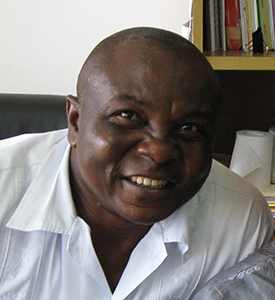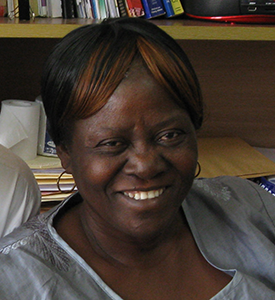Faces from the Field: Liberia Staff Shift Focus to Ebola
Teah Doegmah and Marietta Yekee, Program Officers in Liberia for CCP’s Health Communication Capacity Collaborative, embody CCP’s trademark expertise, innovation and creativity. Since their work shifted abruptly to the Ebola outbreak in July, they are using their expertise in health communication to fight the deadly disease. Marietta, for example, is training health workers on how to safely use, remove and dispose of plastic bags that are used as protective barriers when gloves aren’t available. Teah is instructing journalists in crisis reporting and providing community radio stations with broadcast guidelines to use when talking about Ebola.
[columns]
[column size=”1/2″]
Teah Doegmah has just returned from a morning in the field where he asked Liberians about a prospective Ebola vaccine trial. He wanted to know whether they had safety concerns or opinions about who should administer the vaccine and where.
In the fight against Ebola, the answers Teah receives are as valuable as the vaccine, itself. They contain the clues necessary to craft innovative communication campaigns that will address and allay fears and encourage participation in a vaccine trial.
Teah, a social and behavior change program officer, quickly realized that proper Ebola prevention and treatment measures can only occur by stopping rumors and misperceptions. “Immediately after the outbreak of the Ebola virus, the word spread that Ebola has no cure,” says Teah, who grew up in Greenville in southeastern Liberia. As a result, people were discouraged from seeking treatment. Rumors warning of the dangers of vaccination made the problem worse.
Teah is fighting Ebola with knowledge and creativity gained from years of experience.
In the early 1980s, he served as a development radio program producer at the USAID-sponsored Liberian Rural Communications Network. This project “used radio to promote rural development focusing on health, agriculture, education, sanitation and community development.”
The war destroyed all that Teah had worked to build. But he found other ways to help his country. In 1997, Teah joined Talking Drums Studio, where he and others created radio programs to promote conflict resolution as part of the organization Search for Common Ground.
In 2003, Teah developed radio stations for Mercy Corps in Liberia’s 15 counties “to improve civic action among the people.” Later, he joined CCP on a Ministry of Health and Social Welfare (MOHSW) community health project. Next, he moved to the Rebuilding Basic Health Services (RBHS) initiative. “That’s how I was introduced to health communication,” he says.
Since the RBHS initiative ended Oct. 31. Teah has continued to work with CCP on Ebola. “Our job is to create demand for services available to clients and to overcome their crisis of confidence.”
Getting the right messages out remains a challenge. That’s where CCP’s blend of expertise, innovation and creativity is so important. “When a message is received and accepted, Teah says, “It’s really fascinating to see someone go from one level of understanding to the next.”
He sees a future for his country that is free of Ebola and strife. “We have slipped back into an emergency and now we have to go into another period of recovery before we can develop again,” Teah says. “I’m very optimistic that in the not too distant future we can begin to realize our dreams, especially in the area of health.”[/column]
[column size=”1/2″]
When Ebola erupted across Liberia earlier this year, Marietta Yekee and colleagues traveled to a hotspot in Lofa—the county where her parents are from. At the time a program officer for CCP working on the RBHS project, she found a region in despair. The four body bags she and colleagues brought with them were quickly snatched up while other bodies in need of burial lay on the ground. The disease was spreading rapidly and people were overwhelmed and panicking. “‘We don’t even know what to do,’” one man told Marietta.
“I stood there and felt very terrible,” she says. She began to help the community make a plan to regain control. “We had a meeting and began to prepare to fight the epidemic,” says Marietta, who grew up on the Firestone rubber plantation outside Monrovia. With her expert guidance, village residents organized into teams of volunteers and drew up a plan for what they wanted to do and achieve.
A day-by-day strategy took shape. People became calmer. “‘We needed someone to talk to. We didn’t know anything. We needed to be more composed and to sit and relax a bit,’ ” a community member later told Marietta.
Marietta, who recently received a masters of public health degree, has the experience and strength to fight Ebola. Forced into exile with her family for nine years during the war, she found health and education work in Cote d’Ivoire. When she returned to Monrovia, Marietta worked for MOHSW and then a UNICEF-sponsored breastfeeding advocacy group. With the civil war’s recurrence, Marietta joined nutritional programs in other West African countries.
She returned to Monrovia once again and found an ad in the newspaper placed by CCP for someone with social and behavior change experience. She got the job and has remained with CCP ever since.
It’s depressing to see Ebola erase the gains she helped to achieve, Marietta says. Still, her belief in innovative ways to change life for the better gives her hope “that Liberia will one day be a safe, healthy place to live.”[/column]
[/columns]
*This post originally appeared on the Johns Hopkins Center for Communication Programs website.










Leave a Reply
Want to join the discussion?Feel free to contribute!